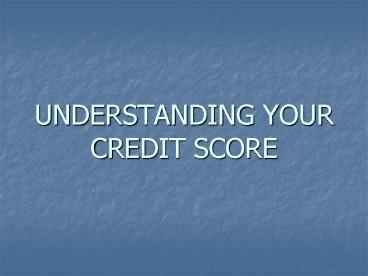UNDERSTANDING YOUR CREDIT SCORE - PowerPoint PPT Presentation
1 / 17
Title:
UNDERSTANDING YOUR CREDIT SCORE
Description:
Check on your credit. WARNING SIGNS OF DEBT. You don't have any savings ... Do not use checking accounts. Retirement Savings. 401k Plan. IRA's- Roth and Traditional ... – PowerPoint PPT presentation
Number of Views:195
Avg rating:3.0/5.0
Title: UNDERSTANDING YOUR CREDIT SCORE
1
UNDERSTANDING YOUR CREDIT SCORE
2
- Whether you realize it or not, your credit score
is a very important aspect of your financial
status. It can mean the difference between
getting a loan and not getting a loan, and it can
also affect the interest rate. Many of us do not
understand how a credit score is calculated, or
more importantly how, if your credit score is
less than perfect, we can improve it.
3
- Credit Scores range from 300 850
- A good score is 700 or better
- A bad score is below 600
- Your score can affect a variety of things
4
WH0 LOOKS AT YOUR SCORE
- Potential Lenders- Score determines interest rate
- Landlords
- Insurance companies
- Employers
- Any government agency
5
HOW YOUR CREDIT SCORE IS BROKEN DOWN
- 35Payment History More weight is based on
current pay history. Ex. 40 of credit weight
consists of payment history over the past 12
months, 30 for 13-24 months, 20 for 25-36
months, and 10 in excess of 36 months. - 30Credit Capacity A members score will be
higher the lower a members debt level is compared
to available credit. - 15Length of Credit The more years with credit
history the better. - 10Accumulation of debt in the last 12-18
months, especially the number of inquiries made
and opening dates. - 10Credit mix Installment debt raises scores
while revolving debt will lower a score. Also,
the higher number of finance company loans, the
lower the score.
6
ACTIONS THAT HURT YOUR SCORE
- Missing payments
- Credit cards at maximum limit. Keep balances
below 75 of available credit - Shopping for credit excessively
- Opening up numerous accounts in a short period of
time - Having more revolving loans
- Borrowing from finance companies
7
BEST WAYS TO IMPROVE YOUR SCORE
- Pay down credit cards
- Do not close all of your credit cards
- Continue to make payments on time
- Slow down on opening new accounts
- Acquire a solid credit history
- Move revolving debt to installment debt
8
HOW FAST DOES MY SCORE CHANGE?
- Your score can change on a monthly basis
- In a three month period only 1 person in 4
- Has a 20 point or more change
- Bankruptcy or late payment lower your score
quickly - Inquires lower your score by around 5 points
- Check your score every 6-12 months
9
HOW CAN I GET MY SCORE?
- If you are turned down for credit
- Equifax- www.equifax.com
- www.myfico.com
10
MANAGING DEBT
- Assess your situation
- Understand your spending
- Create a budget
- Reduce your expenses
- Find a low-cost credit card (average family has
7000.00 in credit card debt, pay out 1000.00
per year in interest - Consider consolidating your bills
- Talk to a debt Counselor
- Check on your credit
11
WARNING SIGNS OF DEBT
- You dont have any savings
- Making minimum payments on credit cards
- You have 3 or more major credit cards
- Near credit limit
- Taking cash advances to pay bills
- Dont know how much debt you have
- Declined for credit
12
LENDERS LOOK AT YOUR DEBT
- Debt to income ratio- 40
- Large scale debt such as your home should be no
more than 20 of your income - Credit
- Collateral
- Purpose
13
- Stop Incurring Debt
- Dont expect Miracles
- Plan for the future!!!!!!!!!!
14
SAVING MONEY
- Experts recommend saving 3-6 month salary
- Save at least 10 for retirement
- Set savings goals
15
ACCOUNTS YOU CAN USE TO SAVE
- Savings account
- Money Markets
- Christmas Clubs
- Vacation Clubs
- Pay-roll deduction or direct deposit
- Do not use checking accounts
16
Retirement Savings
- 401k Plan
- IRAs- Roth and Traditional
- Annuity
17
THANK YOU FOR ATTENDING































